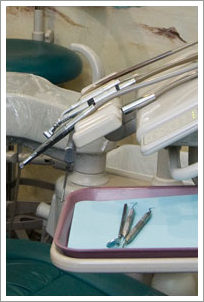Good Oral Hygiene Affects Overall Health—
Visiting your dentist for regular check ups and cleanings is one of the most important factors in maintaining good oral health, as well as overall health. There are many dental conditions that can be prevented by regular check ups: cavities, root canals, gum disease, oral cancer, and other dental conditions can be detected by your dentist, and your chances of successful treatment are greatly enhanced if these conditions are caught early and treated before they have caused significant (sometimes permanent) damage to your teeth and your mouth’s bone structure.
You should not wait until you have a problem before you see your dentist. Instead, visit your dentist regularly (usually every 6 months) to help prevent problems before they happen.
Brush at Least Twice Each Day—
Throughout the day, the food that you eat and the bacteria in your mouth will accumulate and form a soft, sticky layer on your teeth. This substance is known as plaque, and the longer it stays in contact with your teeth the greater the chances for tooth decay; cavities. Brushing helps remove plaque, and flossing between your teeth removes the plaque that the toothbrush can’t reach. Not only does brushing and flossing remove plaque but it also helps prevent gum disease.
Dental Problems Don’t Fix Themselves—
Teeth require maintenance, just like an automobile. If a car blows a tire, the tire will not repair itself if you simply keep driving. When something goes wrong in your mouth (such as a continual pain in your tooth), proper dental care is your best remedy. Once a dental care plan has been discussed with your dentist, you should concentrate on resolving the problems as soon as possible. Over time, a small cavity can continue to grow until the decay has reached the nerve. When this happens, your only options are a root canal or tooth extraction.
Root Canals Aren’t Usually Painful—
It’s true! With the advancements in technology, most routine root canals are no more painful than getting a filling. Sure, there are some instances where a root canal has been unpleasant but such cases are now the exception and no longer the rule. Your dentist will help you decide on the best plan of action should a root canal be necessary, but you should not delay for fear of pain. After the root is removed, the hot and cold sensitivities that your tooth reacts to will generally no longer bother you.
Toss That Tattered Toothbrush—
If you brush your teeth regularly as prescribed, your manual toothbrush will be worn out and less effective after about 3 months. If you have gum disease, you should change your toothbrush after a month or so, and if you are sick you should get a new toothbrush when you start to feel better (the bacteria from your mouth can be caught deep in the bristles, so changing the toothbrush is recommended). Also, always remember to rinse your toothbrush in hot water after each use.
Suggested Reading—
■ How to Brush Your Teeth Properly
■ Important Reasons to Brush and Floss
■ Children's Dental Basics
